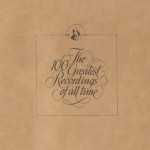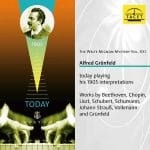

Composer: Ludwig van Beethoven, Ferencz Liszt
Performer: Sophie Pacini
Format: FLAC (tracks)
Label: Warner
Catalogue: 9029597702
Release: 2016
Size: 1.28 GB
Recovery: +3%
Scan: yes
Beethoven: Piano Sonata No. 21 in C major, Op. 53 ‘Waldstein’
01. I. Allegro con brio
02. II. Introduzione. Adagio molto
03. III. Rondo: Allegretto moderato – Prestissimo
Liszt: Consolations, Six Pensées poétiques, S. 172
04. No. 1 in E Major
05. No. 2 in E Major
06. Liszt: Overture to Tannhäuser – Concert Paraphrase, S. 442
07. Liszt: Réminiscences de “Don Juan” (after Mozart), S. 418
08. Liszt: Liebestraum, S541 No. 3 (Nocturne in A flat major)
09. Liszt: Hungarian Rhapsody, S244 No. 6 in D flat major
“Sophie Pacini is a protégée of Martha Argerich and it shows…There’s a similar air of in-the-moment rhapsodising and no fear of giving the performance a boot up the backside.” Gramophone
Born in Munich in 1991, Pacini began her studies at the age of ten as a pupil of Karl-Heinz Kämmerling at the Salzburg Mozarteum, where she was accepted two years later by the newly founded Institute for Highly Gifted Students. From 2007 she continued her studies in master classes given by Pavel Gililov, completing her diploma in 2011 with honours. In 2010 she became acquainted with Martha Argerich, who invited her the following year to give a recital as part of the Martha Argerich Project in Lugano, and who has since become an important figure in the young pianist’s career.
“Our first project combines works by Beethoven and Liszt, two composers who have influenced me a great deal musically. They embody what has fascinated and captivated me about the piano from the beginning: the ability to transpose an entire orchestra onto the keyboard and trace the complexity of a score in fine detail, as well as the idea of the instrument as a powerhouse of musical evolution.” Sophie Pacini
The young pianist Sophie Pacini has been touted as the next big thing by Martha Argerich, something that should make you sit up and take notice. The evidence from this album is positive. The pairing of Beethoven and Liszt, the Viennese theme-worker and the exotic Parisian showman, is not that common today, but it certainly would have been in Liszt’s own time, and Liszt might easily have played this exact program (and enjoyed the way Pacini plays it). Pacini opens with the Beethoven Piano Sonata No. 21 in C major, Op. 53 (“Waldstein”), given a detailed reading that isolates all the sixteenth notes and emphasizes the work’s poetic qualities, as if to whet the appetite for the fireworks to come. And come they do, although this is rather poetic Liszt itself, not the keyboard-pounding stuff. Again, this is something with which Liszt would have had no problem. Pacini’s strength lies in capturing the breadth of Liszt’s conceptions, which would have seemed as amazing as his keyboard heroics to listeners of his own time. Sample the relatively rarely recorded transcription of the Overture to Wagner’s Tannhäuser, which shows you something both of Liszt’s pianism and of Pacini’s. With fine sound from the Sendesaal Bremen, Warner Classics propels its young find to the front of the pack of new pianists.



